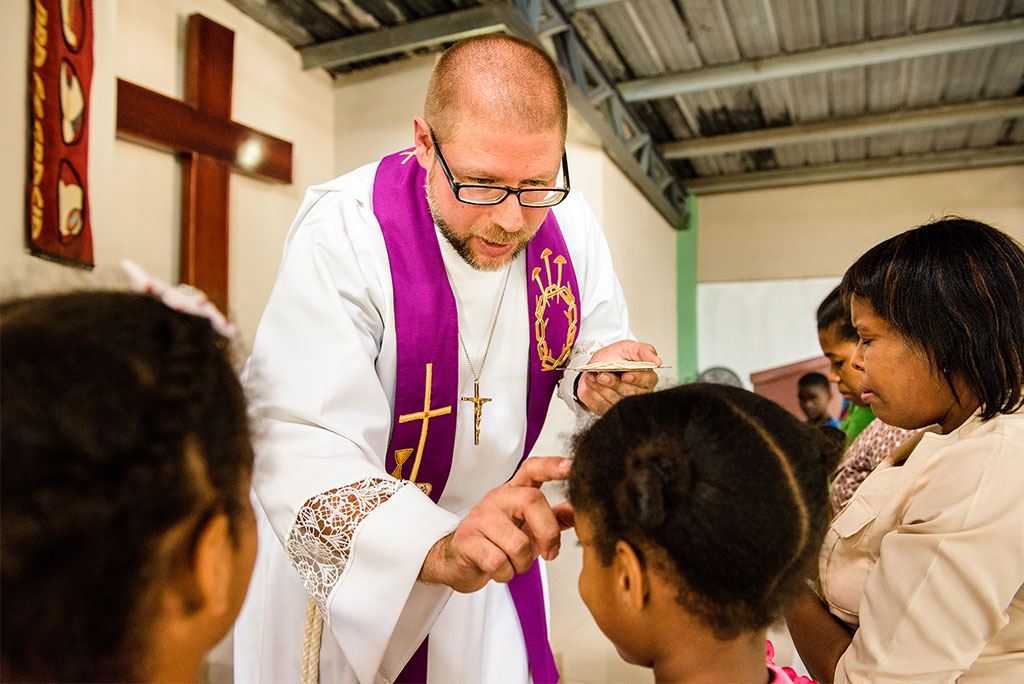
Where is the Church? Toward the end of his life, Martin Luther wrote a lengthy critique of the medieval church and its need for reformation, based on Holy Scripture. Toward the end of this document, Luther identified what he called the seven “marks” of the Church. By these marks, one can know where the Church is located: God’s Word; Holy Baptism; the Sacrament of the Altar; the Office of the Keys; called ministers; and prayer, praise and thanksgiving to God. Luther concluded his list with the seventh mark of the Church: the sacred cross. — Editor
Seventh, the holy Christian people are externally recognized by the holy possession of the sacred cross. They must endure every misfortune and persecution, all kinds of trials and evil from the devil, the world, and the flesh (as the Lord’s Prayer indicates) by inward sadness, timidity, fear, outward poverty, contempt, illness, and weakness, in order to become like their head, Christ. And the only reason they must suffer is that they steadfastly adhere to Christ and God’s word, enduring this for the sake of Christ, Matthew 5 [:11], “Blessed are you when men persecute you on my account.” They must be pious, quiet, obedient, and prepared to serve the government and everybody with life and goods, doing no one any harm. No people on earth have to endure such bitter hate; they must be accounted worse than Jews, heathen, and Turks. In summary, they must be called heretics, knaves, and devils, the most pernicious people on earth, to the point where those who hang, drown, murder, torture, banish, and plague them to death are rendering God a service. No one has compassion on them; they are given myrrh and gall to drink when they thirst. And all of this is done not because they are adulterers, murderers, thieves, or rogues, but because they want to have none but Christ, and no other God. Wherever you see or hear this, you may know that the holy Christian church is there, as Christ says in Matthew 5 [:11–12], “Blessed are you when men revile you and utter all kinds of evil against you on my account. Rejoice and be glad, for your reward is great in heaven.” This too is a holy possession whereby the Holy Spirit not only sanctifies his people, but also blesses them. …
These are the true seven principal parts of the great holy possession whereby the Holy Spirit effects in us a daily sanctification and vivification in Christ, according to the first table of Moses. By this we obey it, albeit never as perfectly as Christ. But we constantly strive to attain the goal, under his redemption or remission of sin, until we too shall one day become perfectly holy and no longer stand in need of forgiveness. Everything is directed toward that goal. I would even call these seven parts the seven sacraments, but since that term has been misused by the papists and is used in a different sense in Scripture, I shall let them stand as the seven principal parts of Christian sanctification or the seven holy possessions of the church. …
In summary, if God were to bid you to pick up a straw or to pluck out a feather with the command, order, and promise that thereby you would have forgiveness of all sin, grace, and eternal life, should you not accept this joyfully and gratefully, and cherish, praise, prize, and esteem that straw and that feather as a higher and holier possession than heaven and earth? No matter how insignificant the straw and the feather may be, you would nonetheless acquire through them something more valuable than heaven and earth, indeed, than all the angels, are able to bestow on you. Why then are we such disgraceful people that we do not regard the water of baptism, the bread and wine, that is, Christ’s body and blood, the spoken word, and the laying on of man’s hands for the forgiveness of sin as such holy possessions, as we would the straw and feather, though in the former, as we hear and know, God himself wishes to be effective and wants them to be his water, word, hand, bread, and wine, by means of which he wishes to sanctify and save you in Christ, who acquired this for us and who gave us the Holy Spirit from the Father for this work? …
It is God’s will that we obey his word, use his sacraments, and honor his church. Then he will act graciously and gently enough, even more graciously and gently than we could desire; for it is written, “I am the Lord your God; you shall have no other gods before me” [Exod. 20:23]. And, “Listen to him and to no other” [Matt. 17:5]. May that suffice on the church.
Excerpted from “On the Councils and the Church,” 1539, in Luther’s Works: American Edition, Vol. 41, Pgs. 164–166, 172–173 (© 1966 Fortress Press. Admin. Augsburg Fortress). Used with permission.
Posted Oct. 31, 2017